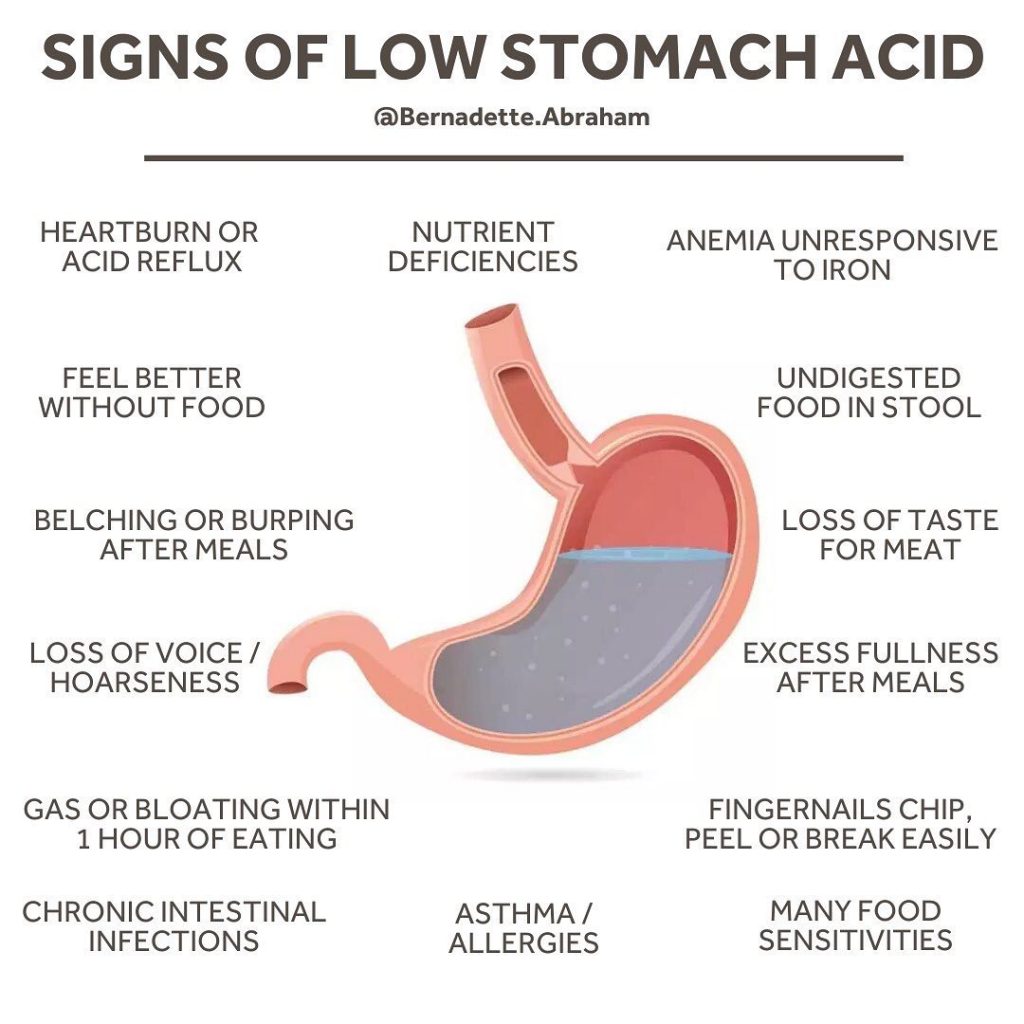
For anyone suffering from heartburn, indigestion, reflux or GERD, there’s a great book called “Why Stomach Acid is Good For You”.
In fact, acid reflux is not usually caused by having too much stomach acid, but rather not having enough!!
Yes, you read that correctly. It’s usually acid in the wrong place – and is most often triggered by insufficient stomach acid!
Without a good amount of stomach acid, your meal just sits there in the stomach; proteins putrefy, fats rancidify, and carbs ferment, which can cause a lot of gas and bubbling.
And whatever little stomach acid you do have can bubble up and spill into the lower part of the esophagus (that long tube that connects your throat to your stomach) where it doesn’t belong – and hence the burning.
So why do doctors prescribe antacids and acid blockers to lower stomach acid if low stomach acid is usually the cause?
That’s the main difference between conventional allopathic medicine and functional medicine.
Allopathic medicine tells you WHAT you have and helps MANAGE symptoms, whereas functional medicine aims to answer WHY you have it and helps REVERSE dynamics.
Stomach acid also helps:
1️⃣ Break down proteins for making enzymes, antibodies, hemoglobin, hormones, detoxification… (the downstream consequences of not breaking down and absorbing protein is HUGE!)
2️⃣ Absorb key minerals and vitamins like magnesium, iron, calcium, zinc, and vitamin B12
3️⃣ Kill off any pathogens that may enter orally through food or water. Think of stomach acid as our very own cleansing tank and part of our passive immunity.
Let’s shed more light on some of the downstream consequences and symptoms of low stomach acid or “hypochlorhydria” before getting into the causes and solutions:
1️⃣ First, we need stomach acid to break down protein. If we don’t have enough stomach acid, you can expect:
– Muscle loss, therefore feeling weak
– Impaired detoxification, therefore acne and hormone imbalance
– Impaired neurotransmitter production, therefore mood changes, poor sleep, uncontrollable cravings or binge eating/drinking
– Hypothyroid function, therefore constipation, hair loss, fatigue, brittle nails, always feeling cold, and sluggish digestion – a real catch 22!
2️⃣ We need stomach acid to absorb key nutrients. If we don’t have enough, you can expect:
– low B12, therefore low energy, impaired methylation and detoxification
– low magnesium, therefore headaches, constipation, asthma/allergies, spasms
– low iron or anemia unresponsive to iron supplementation, therefore cold hands and feet, pale skin, low energy, hair loss
– low calcium, therefore risk of bone loss and osteoporosis
– low zinc, therefore weak immunity, hypothyroid function and poor wound healing
3️⃣ We also need stomach acid to “kill” pathogens entering orally from food, water or the skin and also to signal the pancreas to produce digestive enzymes.
Otherwise, expect chronic intestinal infections like parasites or bacteria, and undigested food that can cause gas and bloating.
What are some of the common causes and solutions for low stomach acid or hypochlorhydria?

1️⃣ Gastric infection and overgrowth of H Pylori bacteria, which causes 90+% of ulcers and many cases of gastritis, suffocates stomach acid production.
Testing is possible through stool (I prefer GI Map by @dxsolutionslab), breath or blood.
Mastic gum, broccoli sprouts and zinc carnosine can effectively eradicate overgrowths.
2️⃣ Stress & eating too quickly! The smell and sight of food and the act of chewing triggers release of copious hydrochloric acid.
Eating on the run or wolfing down food will limit or even stop all digestive secretions including hydrochloric acid in the stomach.
Solution? Sloooow down and eat mindfully! Simple but powerful!
3️⃣ A sluggish thyroid = sluggish digestion and stomach acid secretion. Investigate estrogen dominance, nutrient deficiencies, stress, infections, toxins.
4️⃣ Exposure to environmental or food sensitivities can cause the parietal cells lining the wall of the stomach to “shrink” and produce less acid (i.e. common with asthma).
Solution? Test for food sensitivities or try a minimum 1-month elimination challenge of the most offending foods such as dairy, gluten, yeast, corn, nuts, and peanuts.
5️⃣ Stomach acid production dramatically declines with age. Sometimes mixing a teaspoon of apple cider vinegar in a glass of water before a meal can help.
More often, supplementing with betaine and pepsin can bring much needed relief (as long as there is no H pylori infection).
6️⃣ Nutrient deficiencies such as zinc and B1 can directly affect stomach acid production. Vegetarian and vegan diets which tend to be higher in copper can also deplete zinc. Test your levels.
7️⃣ Grazing! The largest secretion of stomach acid happens with distention of the stomach after eating a good portion of food; snacking all day long will likely not trigger optimal digestive secretions.
I hope you’re starting to see just how foundational stomach acid is to overall health. As always, please consult with a naturopathic doctor or functional practitioner to know what’s right for you.
If you have any comments or questions, please feel free to leave them below.

Leave a Reply